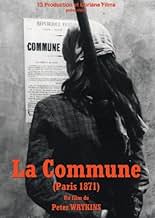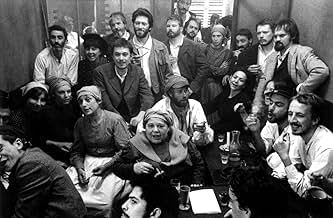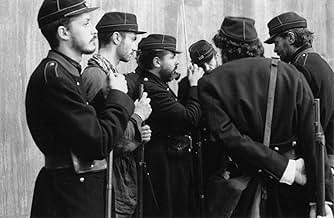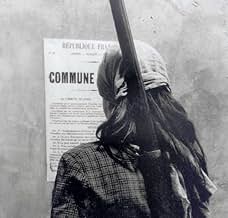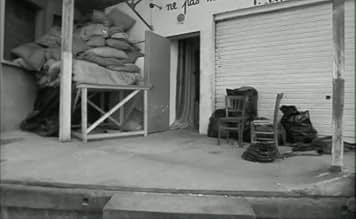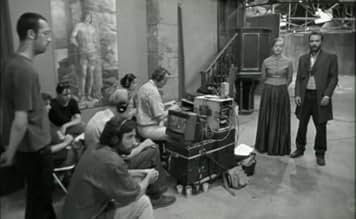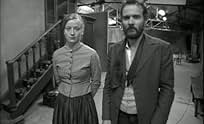IMDb-BEWERTUNG
8,0/10
1435
IHRE BEWERTUNG
Füge eine Handlung in deiner Sprache hinzuIn this war drama blurring the lines between documentary and fiction, the working class and the bourgeoisie of 19th century Paris are interviewed and covered on television, before and during... Alles lesenIn this war drama blurring the lines between documentary and fiction, the working class and the bourgeoisie of 19th century Paris are interviewed and covered on television, before and during a tragic workers' class revolt.In this war drama blurring the lines between documentary and fiction, the working class and the bourgeoisie of 19th century Paris are interviewed and covered on television, before and during a tragic workers' class revolt.
- Regie
- Drehbuch
- Hauptbesetzung
- Auszeichnungen
- 1 Gewinn & 1 Nominierung insgesamt
Empfohlene Bewertungen
Peter Watkins' nearly 6-hour long docudrama, "La Commune (Paris, 1871), is a surprisingly passionate and fast-moving lesson in history. It is also a brilliant demonstration of how history is shaped, and re-shaped, by the tellers of the tale.
Using the "You Are There" approach of earlier radio and TV days, Watkins has a male and female news team from "Commune TV" wandering through the poorest district of Paris inviting people to express their grievances against the state to the camera.
While the people bitterly suffer because of the government's inept defeat at the hands of the Germans during the Franco-Prussian War, their anger inspires solidarity for them throughout Paris, and although they briefly rise up and seize power, they are brutally put down in the end.
Ironically, during the course of their uprising, a TV monitor in the background features happy-talk "Versailles TV" news anchors, who continually vilify the Communards and rationalize the government's brutal acts of suppression.
"La Commune (Paris, 1871)" is a must-see for students of history, and a must-see for students of the media.
Using the "You Are There" approach of earlier radio and TV days, Watkins has a male and female news team from "Commune TV" wandering through the poorest district of Paris inviting people to express their grievances against the state to the camera.
While the people bitterly suffer because of the government's inept defeat at the hands of the Germans during the Franco-Prussian War, their anger inspires solidarity for them throughout Paris, and although they briefly rise up and seize power, they are brutally put down in the end.
Ironically, during the course of their uprising, a TV monitor in the background features happy-talk "Versailles TV" news anchors, who continually vilify the Communards and rationalize the government's brutal acts of suppression.
"La Commune (Paris, 1871)" is a must-see for students of history, and a must-see for students of the media.
Almost 6 hours long, this epic and enlighten looked at revolt and innovative political popular innovation and inspiring uprising of the commune in 19th century Paris is long and starts slow. It is self-reflective, free and breaks the 4th wall since the first frame and increasingly throughout the film.
The first part focuses on the background and beginning of the revolt and resistance. It explains the inequalities, the education gap, the history and bourgeois, military and blue collar vantage points.
Themes of women rights and education are abundantly explored and counterpoints are somewhat given although the work is clearly socialism and rightly so.
Mainstream media, its biases and impact are explored and although historically TV reporting did not exist at that time. adds an element of modernness, contrasted with the black and white and first-time actors in characters with costumes and minimal decor. The clear and more subtle subterfuge and power of religious authority is well confronted. Same as the military might and oppression as necessity versus violent resistance and what violence entails.
The nonprofessional actors who have been instructed to research their historical characters, the history and facts and to speak their own mind are asked to come out of characters many times in the second, slightly longer part and the beauty and brillance of the film is now in full boom.
Actors and characters discuss turn of the millennium and other 20th century realities like other resistances, fights, wars, repression and innovations including technology. Television, internet, mobile phones and the rest are pacifiers or cause for more unrest? What are we fighting for today and how will it be tomorrow? What and why should we fight? How? Within with morale compass and rules? Many crucial questions are raised and many valid points advanced. All of them still relevant and real today as in 1999 or 1871.
A must-watch film for any conscious moviegoer or any worldwide school children. Enjoy, think, discuss, share.
The first part focuses on the background and beginning of the revolt and resistance. It explains the inequalities, the education gap, the history and bourgeois, military and blue collar vantage points.
Themes of women rights and education are abundantly explored and counterpoints are somewhat given although the work is clearly socialism and rightly so.
Mainstream media, its biases and impact are explored and although historically TV reporting did not exist at that time. adds an element of modernness, contrasted with the black and white and first-time actors in characters with costumes and minimal decor. The clear and more subtle subterfuge and power of religious authority is well confronted. Same as the military might and oppression as necessity versus violent resistance and what violence entails.
The nonprofessional actors who have been instructed to research their historical characters, the history and facts and to speak their own mind are asked to come out of characters many times in the second, slightly longer part and the beauty and brillance of the film is now in full boom.
Actors and characters discuss turn of the millennium and other 20th century realities like other resistances, fights, wars, repression and innovations including technology. Television, internet, mobile phones and the rest are pacifiers or cause for more unrest? What are we fighting for today and how will it be tomorrow? What and why should we fight? How? Within with morale compass and rules? Many crucial questions are raised and many valid points advanced. All of them still relevant and real today as in 1999 or 1871.
A must-watch film for any conscious moviegoer or any worldwide school children. Enjoy, think, discuss, share.
Peter Watkins stands at the base of a form of historical documentaries known as 'documentary reconstruction'. Lightly based on battle re-enactments, Watkins hires amateur actors to play the roles of common people in the Paris of 1871. Famine and civil unrest cause a popular revolution, supported by followers of Karl Marx. The people take power and form a Commune, a communist government. After a few weeks, the official Versailles government regains the city by force, and tens of thousands of people are executed.
Watkins' historical drama is based on the common people, which are shown in their everyday life. To do this, he introduced an anachronism: in the 1871 context, the people form a tv station. The Versaillais also have their official tv station. This way, the documentary becomes both a social project and a media experiment.
Watkins' historical drama is based on the common people, which are shown in their everyday life. To do this, he introduced an anachronism: in the 1871 context, the people form a tv station. The Versaillais also have their official tv station. This way, the documentary becomes both a social project and a media experiment.
I don't think this is Peter Watkins's "best" film, exactly. It lacks the discipline and precision of "Edward Munch." But this is the purest example of the potential of Watkins's practice. Few films I've ever seen have felt as alive as a collaboration between a director and a group of performers. The non-actors, denizens of a working-class neighborhood of Paris, lived together and collaborated with Watkins as a legit, studio-based commune during their re-enactment of the events of Paris, 1871. In the film's second half, the reenactment subtly starts to occasionally give way to conversations between the performers during the course of the production. The past starts to seem truly "re-enacted," as the "present" seems to become part of a work of historical story-telling. In the final scenes, the actors seem to go into a kind of trance of fury as they sing revolutionary songs while awaiting to defend the city from Versailles' soldiers. Many turn to the camera and say that they would pick up guns to fight for a new commune in the present. As a viewer, I believed them.
This film also goes farther in its critique of media than Watkins' earlier films. All of Watkins's films feature a contemporary documentary camera crew interviewing historical figures in a way that is quite confrontationally unnatural. In the previous films, the (seemingly) Watkins-led camera crews were portrayed as the allies of "the people." Here, the larger canvas allows for a more nuanced critique of even "people's media." Two media outlets vie for the hegemony of the viewer: Versailles News and Commune TV. Even Commune TV, the "ragtag, independent" news outlet is presented as always veering towards the most relatively conservative seats of power. The Commune reporters consistently defend the (I think rather inappropriately maligned) "professional" Commune leadership from the masses. (As much as I admire Watkins, he is undeniably an ultra-leftist.) I wonder, however, if this more complex take on the media is not tied to the more complex layerings of "realities" in this work that I discussed in my first paragraph. For, unlike, in the earlier films, here the "progressive" media outlet (Commune TV) is not the "highest" reality, and therefor is not directly attached to Watkins himself. It is only part of the historical fiction that Watkins implements to show his performers embrace the political heritage of the Commune. In the scenes where the performers discuss their experiences of the production with each other, Watkins name is only ever mentioned with reverence. The filmmaker deepens his critique of media, but not of his place within it as a "radical saint."
This film also goes farther in its critique of media than Watkins' earlier films. All of Watkins's films feature a contemporary documentary camera crew interviewing historical figures in a way that is quite confrontationally unnatural. In the previous films, the (seemingly) Watkins-led camera crews were portrayed as the allies of "the people." Here, the larger canvas allows for a more nuanced critique of even "people's media." Two media outlets vie for the hegemony of the viewer: Versailles News and Commune TV. Even Commune TV, the "ragtag, independent" news outlet is presented as always veering towards the most relatively conservative seats of power. The Commune reporters consistently defend the (I think rather inappropriately maligned) "professional" Commune leadership from the masses. (As much as I admire Watkins, he is undeniably an ultra-leftist.) I wonder, however, if this more complex take on the media is not tied to the more complex layerings of "realities" in this work that I discussed in my first paragraph. For, unlike, in the earlier films, here the "progressive" media outlet (Commune TV) is not the "highest" reality, and therefor is not directly attached to Watkins himself. It is only part of the historical fiction that Watkins implements to show his performers embrace the political heritage of the Commune. In the scenes where the performers discuss their experiences of the production with each other, Watkins name is only ever mentioned with reverence. The filmmaker deepens his critique of media, but not of his place within it as a "radical saint."
Truly exceptional film making really breaking down the barriers of what is storytelling and letting everything run free. Peter Watkins does what would seem the impossible, not only create a realistic re-enactment of the commune in Paris (just after the siege of the Prussians and the exile of the bourgeois to Versailles) using only an abandoned warehouse and 200 odd unemployed French citizens and illegal immigrants but also to on top of that add a detailed and amazing social experiment. Putting these people through this experience and then have them portray not only their 1871 characters but also themselves in the one film. To hear these people talk about life today and draw parallels between the film they are making and the lives they lead is quite invaluable information. And as if that alone wasn't enough there is the whole other element of the media and how sides are formed and why people believe what they do and how things are taught and passed down so that divides never seem to cease. The use of reporting and television and newspapers really give this film a whole other level from which to operate and constantly throughout the film one has to ask themselves "who do I believe, do I believe anyone" "why am i believing what this person says and not this person" then as if one hasn't had enough thinking to do already you then, like the cast, have to project forward to today and ask yourself who do i believe when it comes to the reporting of current events? Am I receiving an accurate picture of what is occurring? I don't think anyone who offers themselves up to this 6 hour masterpiece can look at the media in quite the same way. Once again I just have to say this film is without a doubt set to become a masterpiece to filmmaking and I urge anyone who happens to see it on a program for a festival or perhaps even on television to sacrifice those few hours, you wont be disappointed. Also is you are left in awe after its viewing as I was then look out for the Universal Clock- The Resistance of Peter Watkins, it acts as a sort of "making of" but is a film in its own right and gives insight to what it was like to be involved in the making of Le Commune Paris 1871
Wusstest du schon
- Alternative VersionenIn December 2002 Peter Watkins started the editing of an abridged theatrical version. In a prologue he expresses his views on discovering that the production company, 13 Production, has financial links with the Lagardère Group (which sells Military Weapons through Matra), then he warns the audience about how much of the sequence shots and live debates from the original full-length movie have been lost in the process of reducing the running time by more than 2 hours to 3 hrs 1/2.
- VerbindungenFeatured in The Universal Clock: The Resistance of Peter Watkins (2001)
Top-Auswahl
Melde dich zum Bewerten an und greife auf die Watchlist für personalisierte Empfehlungen zu.
- How long is La Commune (Paris, 1871)?Powered by Alexa
Details
Box Office
- Bruttoertrag in den USA und Kanada
- 5.340 $
- Eröffnungswochenende in den USA und in Kanada
- 2.930 $
- 6. Juli 2003
- Weltweiter Bruttoertrag
- 21.641 $
- Laufzeit
- 5 Std.(300 min)
- Farbe
- Sound-Mix
- Seitenverhältnis
- 1.66 : 1
Zu dieser Seite beitragen
Bearbeitung vorschlagen oder fehlenden Inhalt hinzufügen

